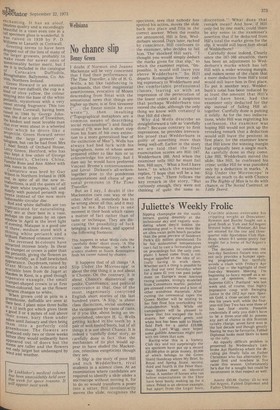Wellsiana
No chance slip
Benny Green
I doubt if Norman and Jeanne Mackenzie will be very concerned that I find their performance in The Time Traveller, a life of H. G. Wells, a bit like tapdancing in quicksands, that their magisterial assertiveness, evocative of Moses descending from Sinai with the sensational news that things are higher up there, is at first tiresome' (" ... the finest simile he ever wrote ''), then insulting ("Topographical metaphors are a common means of describing social relationships") and finally comical ("It was but a short step from his fears of his own extinction to a more generalised fear of the extinction of Man"). Wells has always had bad luck with his biographers, none of whom seem prepared either to like him or to acknowledge his artistry, but I dare say he would have preferred Vincent Brome's censoriousness and Lovat Dickson's all-writerstogetherpose to the ponderous interpretations and chaos of personal pronouns in The Time Traveller.
But as I say, I doubt if the Mackenzies care one way or the other. After all, somebody has to be wrong about all this, and it may well be me. But there is one moment in their book which raises a matter of fact rather than of taste or technique. They are discussing the possibility of luck bringing a man down, and append the following footnote: This happens in what Wells calls the 'carefully done' short story, 'A Slip Under the Microscope,' in which a science student at South Kensington finds his career ruined by chance.
It happens that of all things 'A Slip Under the Microscope' is about the one thing it is not about is Chance. On the contrary, it is about Chance's diametrical opposite, Contrivance, and political contrivance at that. One of the most ingeniously contrived English short stories of the last hundred years, 'A Slip,' is about class distinction, social snobbery, the victimisation by caste of caste, or if you like, about being an impoverished, obscure H. G. Wells getting kicked in the teeth by a pair of well-heeled boots, but of all things it is not about Chance. It is indeed a 'carefully done' story, so carefullSr dbne in fact that the mechanism of its plot would appear to have eluded the Mackenzies, relentless exegeticists though they are. 'A Slip' is the story of poor Hill and rich Wedderburn, rival students in a science class. At an examination where candidates are required to identify a slide under a microscope without moving it, for to do so would transform a poser into a sitter, Hill involuntarily moves the slide, recognises the specimen, sees that nobody has spotted his action, moves the slide back into place and fills in the correct answer. When the results are announced, Hill is first, Wedderburn second. Days later, racked by conscience, Hill confesses to the examiner, who decides to fail him. The shocked Hill says, "I thought you would simply deduct the marks given for that slip," to which the examiner replies, "Impossible. It would still leave you above Wedderburn," So Hill departs Kensington forever, ceding supremacy to Wedderburn and the comfortable professional classes, leaving us with an impression of the persecution of the lower orders and a suspicion that perhaps Wedderburn too moved the slide, although the only thing we know with certain iY is that Hill did cheat.
Why did Wells describe so straightforward a tale as 'carefully done'? Because contrary to first impressions, he provides irrevocable proof that Wedderburn is guilty of something more than being well-off. Earlier in the story we are told that the final examination scores are Hill 167, Wedderburn 166. And when the examiner tells Hill he must fail him, Hill says, "What a fool I have been," to which the examiner replies, "I hope that will be a lesson for you." There follows the key remark in the story, "But curiously enough, they were not thinking of quite the same in discretion." What does that remark mean? And how, if Hill only led by one mark, could there be any sense in the examiner's assertion that if he deducted from Hill's total the marks given for the slip, it would still leave; him ahead of Wedderburn?
Carefully done indeed. Clearly since the 167-166 situation, there has been an adjustment to Wedderburn's marks which has left Hill with a wider winning margin, and makes sense of the claim that a mere deduction from Hill's total would still leave him in first place. To put it another way, Wedderburn's total has been reduced by at least the amount that Hill's would have been, had the examiner only deducted for the slip instead of failing Hill altogether. Carefully done is putting it mildly. As for the two indiscretions, while Hill was regretting his confession, the examiner was hoping Hill would not pick up the revealing remark that a deduction would still leave the penitent in first place, for the examiner knew that Hill knew the winning margin had originally been a single mark. As carefully done as they come. Like Hill, Wedderburn moved the slide; like Hill, he confessed his crime; unlike Hill he was punished only by a deduction in marks. 'A Slip Under the Microscope' is about as much to do with Chance as The Rights of Man is to do with chance, or The Social Contract, or Utile Dorrit.


































 Previous page
Previous page